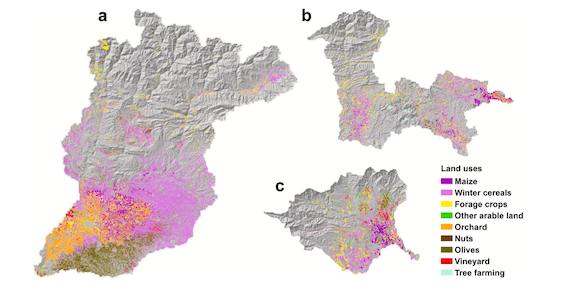In this study, the suitability of major crops currently growing in three case study basins in Catalonia (NE Spain) was assessed for the first half of the 21st century. The results of this study could serve as a basis for the development of adaptation strategies to improve and maintain agriculture in the case study basins and in similar regions.
HIGHLIGHTS
- The main impacts of climate change on crops until 2050 was assessed in three Mediterranean basins.
- Net hydric needs of crops are expected to increase (from + 0.1% to + 6.7%) in all basins.
- Modeling was performed at sub-basin level under the RCP4.5 scenario.
- Advancement (1–12 days) and shortening (8–27days) of the growing cycle are expected.
- A baseline to design adaptation and mitigation strategies was drawn.
ABSTRACT
In this study, the suitability of major crops currently growing in three case study basins in Catalonia (NE Spain) was assessed for the first half of the 21st century. For this purpose, an estimation was made of net hydric needs (NHN) and a set of agroclimatic parameters. Climate change impacts were estimated at sub-basin level using temperature and precipitation temporal series based on the Third Report on Climate Change in Catalonia under the RCP4.5 scenario. Potential crop evapotranspiration (ETc, FAO procedure) and monthly water balance considering soil water holding capacity were used to estimate actual evapotranspiration (ETa) and NHN. Over the period studied, NHN would generally rise, with small (+ 0.1%) to high (+ 6.6%) increases in the 2020 s and moderate (+ 3.9%) to high (+ 6.7%) increases in the 2040 s. Dynamics would be different for the three basins and general trends vary from crop to crop. At all events, a generalized increase in NHN together with lower water availability could severely limit crop productivity in the case of both rainfed and irrigated crops (irrigation restrictions). Phenological changes could represent a greater constraint for crop productivity. Overall, the number of frost days will decrease (from −0.1 days in March to −8.7 days in April) in the three basins, while extremely hot days will increase (from + 0.3 days in July to + 3.8 days in August). Growth cycles will begin earlier (from −1 days to −12 days for crops with a base temperature of 10 °C), and for some crops they will be shorter (from −8 days to −27 days in the case of maize and up to −10 days in the case of vines). The impacts of climate change in the three basins could result in significant limitations for crops if adaptive strategies beyond irrigation and growing cycle issues are not applied. The results of this study could serve as a basis for the development of adaptation strategies to improve and maintain agriculture in the case study basins and in similar regions.

Reference: Funes, I., Savé, R., de Herralde, F., Biel, C., Pla, E., Pascual, D., … & Aranda, X. (2021). Modeling impacts of climate change on the water needs and growing cycle of crops in three Mediterranean basins. Agricultural Water Management, 249, 106797. https://doi.org/10.1016/j.agwat.2021.106797
